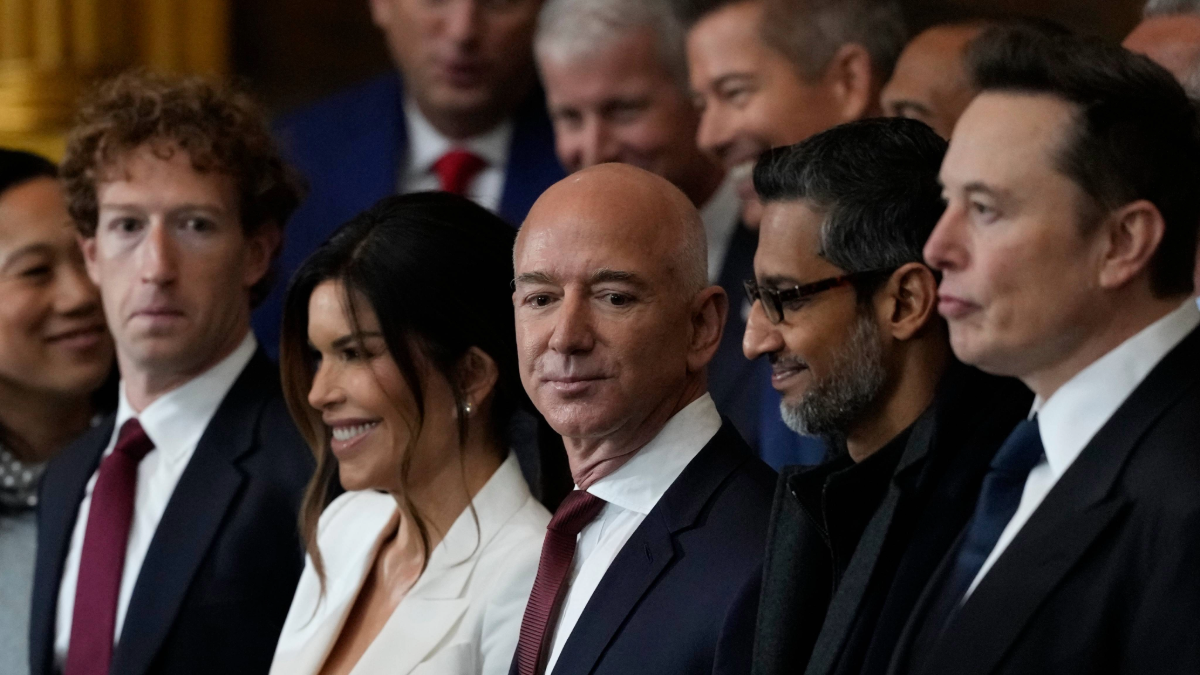Brute Corporate Power and Billionaire Whims Now Define the US Tech Scene
Paul M. Barrett / Feb 11, 2025Paul M. Barrett is the deputy director and senior research scholar at the Center for Business and Human Rights at New York University’s Stern School of Business.

WASHINGTON, DC - JANUARY 20, 2025: Guests including Mark Zuckerberg, Lauren Sanchez, Jeff Bezos, Sundar Pichai, and Elon Musk attend the Presidential Inauguration of Donald J. Trump in the US Capitol Rotunda. (Photo by Julia Demaree Nikhinson - Pool/Getty Images)
As his minions wreck federal agencies, defying congressional statutes and court orders, Elon Musk is launching a hostile bid to take over OpenAI, a leading artificial intelligence developer and rival to his own company, xAI.
Musk’s uninvited $97.4 billion offer may well fail, at least on its current terms. The investor consortium he is leading has bid less than one-third of the estimated value of OpenAI, based on other recent machinations involving the high-profile company.
But the mere flexing of corporate muscle by President Donald Trump’s top financial backer and most influential political ally in the ongoing campaign to purge the United States government of vast numbers of career civil servants in favor of partisan lackeys indicates definitively that we have entered a new era when it comes to the technology industry.
Farewell, regulation; forget about reform. This is a moment for the shameless exercise of sheer economic and political power. The billionaires (a few of whom, led by Musk, may soon be trillionaires) are unshackled, and they intend to have their way.
This is a disaster. It is not clear how—or whether—the development can be arrested.
Left unchecked, it will further concentrate power and influence in the hands of a coterie of moguls intent on currying favor with an American president who himself appears determined to sow chaos as a means of maximizing his own authority at the expense of other branches of government and the rule of law.
Musk leads the pack, but he is not alone. Others are using the flattery that is the coin of the realm in the Trump White House to ingratiate themselves with a president notably hostile to regulation in the public interest and enamored of rank conflicts of interest. The notion that the Trump administration would intervene on antitrust or national security grounds to prevent Musk from eliminating a key rival and massively increasing his role in overseeing a potentially dangerous technology is too ludicrous to discuss at length.
Consider:
- The unsolicited Musk bid for OpenAI — maker of the market-changing generative AI app ChatGPT — reportedly is backed by an investor consortium that includes Valor Equity Partners, Vy Capital, and 8VC, a venture firm led by Joe Lonsdale, co-founder of the controversial tech firm Palantir. Ari Emanuel, chief executive of the powerhouse Hollywood company Endeavor, is also reportedly backing the offer through his investment fund. As noted by The Wall Street Journal, the hostile bid could complicate a plan devised by OpenAI’s CEO, Sam Altman, which includes converting it to a for-profit company from a nonprofit and deploying up to $500 billion on AI infrastructure through a joint venture called Stargate. The likelihood that Musk would misuse OpenAI’s capabilities seems, in a word, high. He was one of the company’s co-founders but left years ago in a power struggle. It’s not clear what he would do with OpenAI, but his rapid transformation of Twitter into X, the hateful and conspiracy-ridden megaphone of the MAGA movement, does not bode well. According to The Washington Post, his subordinates in the so-called Department of Government Efficiency (DOGE) are feeding sensitive personal and financial data into an AI system accessed through Microsoft’s cloud computing service, Azure, as part of their attempt to slash the size and functions of the federal government. Ultimately, it appears that Musk aims to replace as many human civil servants as possible with AI-driven machines — an idea no more grandiose and creepy than exporting human populations to live on Mars.
- Altman, for his part, is no passive victim in this drama. At the Trump inauguration, he got stuck in the overflow room while other tech billionaires like Musk and Mark Zuckerberg landed on the dais. But earlier, according to The New York Times, Altman secured Trump’s backing for a mega-deal with Oracle, MGX, and Japan’s SoftBank. Altman told the president the deal would achieve “artificial general intelligence” — AI that matches human intelligence — during the Trump administration and ahead of Chinese competitors. The day after the inauguration, Altman, once a fierce Trump critic, stood behind the president at a White House ceremony as Trump took credit for the deal, describing it as the “largest AI infrastructure project by far in history.” The question that did not receive enough attention is whether the world should herald AI that rivals human intelligence — and could come to resent human restraints — under the auspices of a Trump administration.
- Zuckerberg, co-founder and CEO of Meta, has been scrambling with the nervous desperation so familiar from his many past appearances at congressional hearings to assuage Trump’s historic animosity, paper over his absurd let’s-fight-a-cage-match rivalry with Musk, and make sure that his company doesn’t get left behind in the AI arms race. Zuckerberg’s chosen strategy has been to endorse Trump’s ideological claims that he has been a victim of a made-up left-wing crusade to “censor” conservative views on social media platforms like Meta’s Facebook, Instagram, and Threads. Apologizing for Meta’s past attempts to reduce the prevalence of bigotry, false conspiracies, and pandemic-promoting anti-vaccination propaganda, Zuckerberg has pulled the plug on outside fact-checking, killed policies designed to mitigate hateful intimidation, and dialed back automated filtering systems that played down content bearing the earmarks of mis- and disinformation — all of this supposedly in celebration of what Zuckerberg called the “cultural tipping point toward once again prioritizing speech” that was Trump’s reelection. In fact, as I wrote recently for The Boston Globe, "The changes at Meta herald not freedom but intolerance and violence.”
Dean Jackson, a Tech Policy Press contributing editor and former investigative analyst with the House Select Committee to Investigate the January 6th Attack on the US Capitol, wrote a sobering piece for this site in November 2024 about the eight-year struggle for tech accountability ending in “defeat.” He correctly observed that
Counter-disinformation, as it has been practiced since 2020, is a dying enterprise in the US. Social media companies learned that not only could they cut costs by reducing their trust and safety teams but that it is safer to ignore criticism of those cuts than to meaningfully combat political disinformation. The federal government significantly reduced its role in protecting election integrity from disinformation in 2024, and civil society efforts to monitor the online environment were more fragmented than in 2020. An organized effort to demonize and discredit disinformation research had considerable success and is, by all indications, set to continue under the second Trump administration….
Tech accountability will remain on the agenda, but ambitions will be diminished. Significant reforms to the poisonous American media ecosystem—of which social media and disinformation are components—look further out of reach than at any point in the last decade.
Jackson was right. A Republican-controlled Congress is not going to pass constructive reform legislation, and if it did, President Trump wouldn’t sign it. Blue states like California and New York will struggle to enforce worthy but fragmentary regulations in the face of industry legal challenges, which, when they reach the Supreme Court, will likely attract support from the Trump Justice Department. Meanwhile, I expect that Congress will emulate right-wing-driven “must carry” legislation enacted in Florida and Texas, where Republicans seek to inhibit whatever weak efforts at content moderation social media platforms are still enforcing.
And all of that, for the moment, is beside the point. The industry has swung into strong alignment with the Trump-Musk administration, and the real action is taking place on the battlefield for AI domination. Tech policy reformers need to cultivate and hone ideas for a hoped-for future beneath different political stars. For now, though, we are mired in a period when malign economic and political might will trump reason — and I, for one, so far do not see realistic paths for resistance. Let’s keep looking.
Authors
